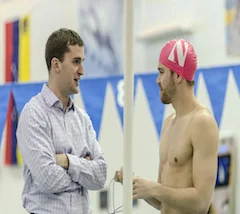It's hard to believe that we are nearly a full year through another Olympic cycle, with Rio a fading memory and Tokyo seemingly approaching at breakneck pace. On the other hand, it's easy to believe when you look at the results of this week's National Championships and World Trials.
Team America is the Golden State Warriors of swimming, only if the team won some ridiculous total like 77-5 in Olympic years and then coasted to 60 win seasons the other three quarters of the time.
The reasons for the slippage make sense. The process of making, then subsequently succeeding as a part of the US Team at the Olympics defies explanation. It is only natural that many of these athletes take some time away from the sport in the aftermath.
Still it's worth to reflect, even when you're the best, or maybe especially when you're the best. Let's set aside the best from Rio: who are the swimmers that could best be pushing the ball forward in this off-Olympic year?
The answer is the post-graduates, the fifth (or sixth) years, the "semi-pro". There are a ton of capable athletes in this group. Relatively few seem to thrive. The answer is not in the 18 and under crowd, of whom there have been some really nice performances this week, and who deserve continued focus on their long term development.
Where are these athletes training? The opportunities for the most part still exist in some awkwardly grafted-on addition to a college or club team. This is not a successful formula for the group as a whole.
The older a swimmer gets, the higher level they get to, the harder it gets to push their performance forward. However, the almost all of these "semi pros" exist in an environment where it would be amount to career suicide for their coaches to devote the big time resources to them that they need. College coaches are hired for college results. Club coaches are paid to coach the paying membership.
These swimmers need a true home, something that is actually designed for them, that gives them the resources that they need for elite performance. It is not USA Swimming's job to do this as top down solutions in this area are usually a mild to spectacular failure.
I've heard a lot of dissatisfaction from the would be sponsors of these athletes. They do not feel they are getting value in return for there sponsorship. This kind of solution would be costly, and it is essential that we identify who is sitting on the sidelines, why they are doing so, and what would be valuable to them in return.
Ultimately, the development of a whole swath of capable swimmers could be a lot better. It will not be easy, but it is possible and, I believe, worth it.
Are you involved in sponsorship of swimming? Write me!

